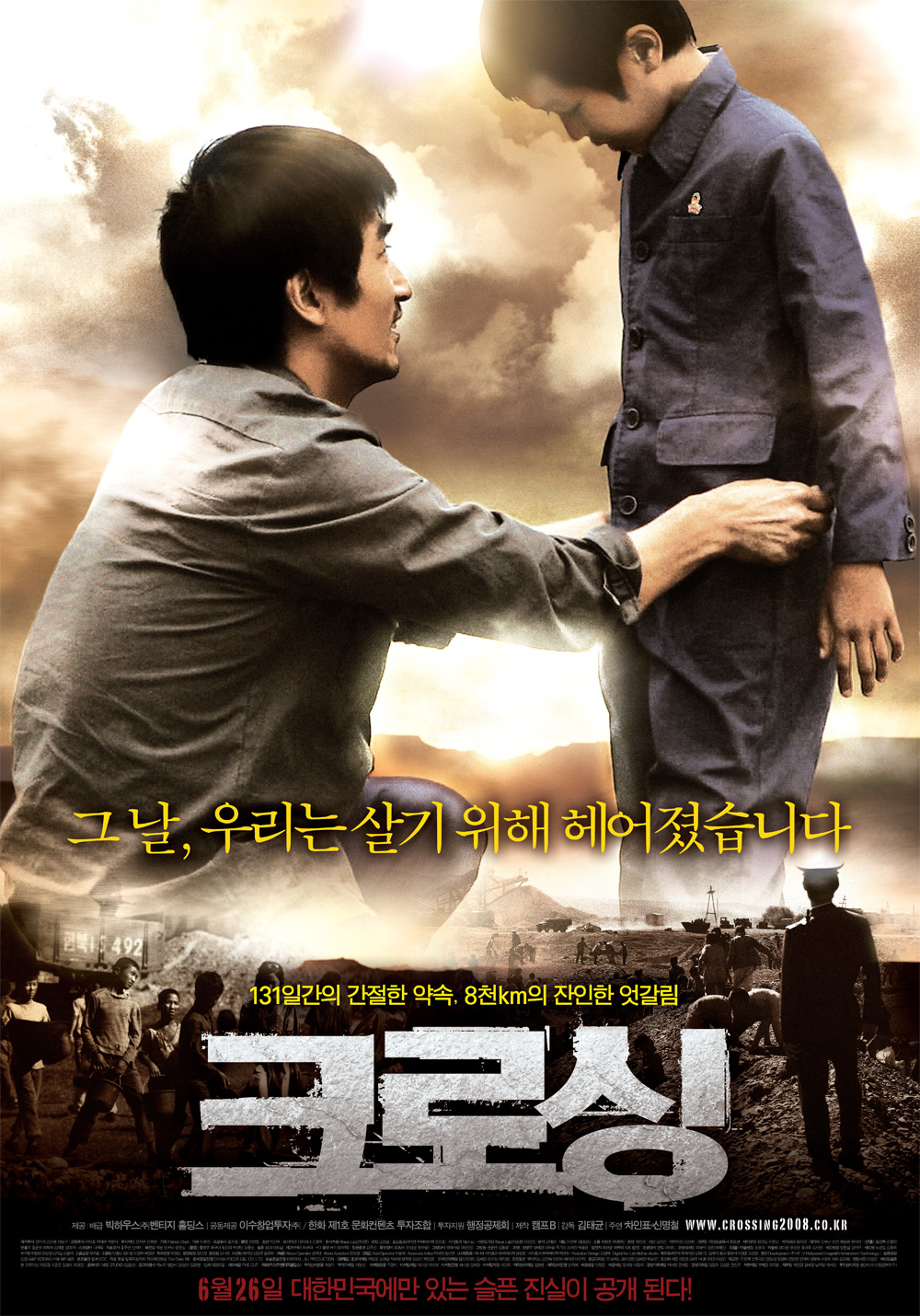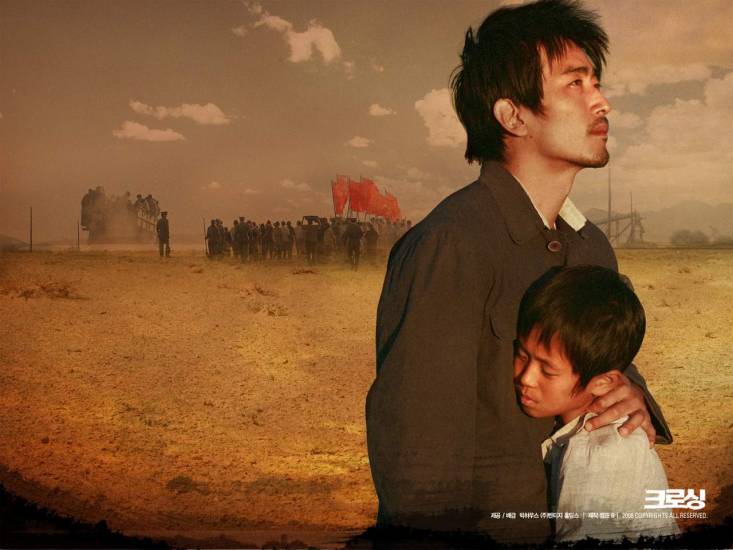
131일 간절한 약속, 8천km 잔인한 엇갈림 그들의 나라는 없다!
Director: Kim Tae Gyoon 김태균
Screenplay: Lee Yu Jin 이유진
Cast: Cha In Pyo 차인표
Sin Myeong Cheol 신명철
Joo Da Yeong 주다영
Seo Young Hwa 서영화
Jeong In Gi 정인기
in North Korea with his wife and young son.
Synopsis: Yong-soo lives in a small coal-mine village
Although living in extreme poverty, the family is happy just to be with each other.
Then one day, Yong-soo’s pregnant wife becomes critically ill. Let alone medicine,
Yong-soo can’t even find food for her in North Korea.
So he secretly crosses the borders of China hoping to find the medicine for his wife.
After many life threatening moments in China, Yong-soo is forced into South Korea,
becoming an unwanted refugee prohibited to return to his family.
Meanwhile, his wife passes away leaving their young son alone in desperation.
With no one to turn to,
his young son sets out to find his father not knowing where or how to find him.
North Korea's Tragedy as Movie Drama
June 26, 2008; Page D7
Call it a "Schindler's List" for North Korea. The difference is that the Steven Spielberg film debuted nearly 50 years after the Holocaust had ended. "Crossing," which premieres today south of the DMZ in Seoul, depicts a tragedy that is still going on -- a tragedy that despite its massive scale rarely captures the world's attention.
The plot of "Crossing" is based on the experiences of those whom South Korea calls "defectors" but are more properly deemed refugees or escapees. These are the men, women and children who defy North Korea's law against leaving the country and cross the border into China, in search of food, livelihoods and -- relative to what they have at home -- freedom. In China, the women and girls are often sold as "brides" to Chinese-Korean men or pressed into service in brothels. The men typically end up hiding in forests or working at logging camps.
Human-rights organizations estimate that there are tens of thousands of North Korean refugees in China, which refuses to let the United Nations help them. The lucky few make their way from China to a neighboring country and then, usually, to South Korea. The unluckiest escapees are captured by Chinese security forces and repatriated to the North, where they face hard labor in a prison camp -- a death sentence for many -- or are executed outright.
You don't have to be familiar with this background to be moved by "Crossing." The film follows the life of the fictional Kim Yong-su, a miner in the bleak northern reaches of North Korea, who leaves his family to flee to China in search of medicine for his dying wife. The title refers to "crossing" the Tumen River, which separates the two countries.
After Chinese police nearly capture Yong-su in a raid on the logging camp where he works, he hooks up with sympathetic locals who help him reach sanctuary in a German consulate. From there he is transferred to South Korea, where he hires a broker to help him get his wife and young son out of the North. He soon learns that his wife has died and that his son has been sent to a prison camp after he was caught trying to cross into China to search for his father. The broker buys the boy's freedom, gets him to China and from there to freedom in Mongolia. I won't reveal the ending.
The most disquieting aspects of "Crossing" are the scenes of daily life in North Korea. one hundred refugees now resident in the South advised the filmmakers, and assistant director Kim Chul Young is himself a defector. Yong-su and his family live in a shack with a single lightbulb. Food is so scarce that his wife scavenges wild vegetables and the beloved family dog is eventually eaten to provide protein. Neighbors disappear one night when police discover Bibles hidden in their ceiling.
Scenes of child beggars in the local marketplace are nearly unbearable to watch. They stand at a distance from the peddlers and shoppers -- all of whom are pitifully poor themselves -- holding open plastic bags until someone takes pity on them and tosses a crust of bread or pours the dregs of a bowl of noodles into the bag. These details, like others in the film, are based on refugee reports. They comport with stories I have heard from the many defectors I have interviewed over the years.
The scenes in the prison camp where the boy, Jun, is taken are also true to life, if "life" is the right word. Dead prisoners are dragged out of their cells in the middle of the night. A woman, pregnant by a Chinese man, is beaten by a guard who curses her "hybrid" baby. Mr. Kim, the assistant director, tells the Web site www.dailynk.com that the scene "had to be toned down a bit," as the real treatment of such women would be too gruesome for audiences to endure.
"There have been many documentaries about life in North Korea," says Patrick Daihui Cheh, one of the producers of "Crossing" and an American of Korean heritage. "But as a feature film, I believe this is the first." The South Korean government has long discouraged making films that might be perceived as "political," he says. "Crossing" walks a "fine line. If a movie seems too political, it will deter people from going to see it." The younger generation of South Koreans don't have a good understanding of what life is like in the North, Mr. Cheh says. "They know, but they don't really know."
There have been private screenings of "Crossing" in New York, Washington and Los Angeles in recent weeks, and it will be shown soon in Tokyo and several European cities. Mr. Cheh says he is looking for a distributor in the U.S. and is talking to independent theater chains.
Jews often say of the Holocaust that the world must never forget. Anyone who sees "Crossing" will not soon forget the suffering of the North Korean people.
Ms. Kirkpatrick is a deputy editor of the Journal's editorial page.
Cry With Us
http://online.wsj.com/article/SB121442915111404803.html
'Life > e—feature—film' 카테고리의 다른 글
| 대장금 Dae Jang Geum (2003) (0) | 2008.09.09 |
|---|---|
| 추격자 The Chaser (2008) (0) | 2008.08.31 |
| 다크 나이트 The Dark Knight (2008) (0) | 2008.07.30 |
| 일지매 一枝梅 IlJimae (2008) (0) | 2008.07.19 |
| 세븐데이즈 Seven Days (2007) (0) | 2008.07.13 |





